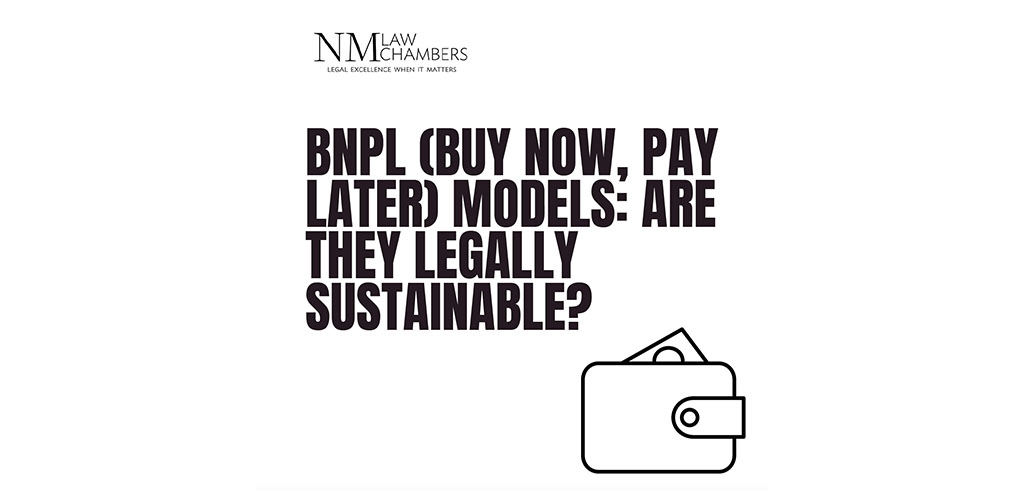INTRODUCTION
Buy Now, Pay Later (BNPL) has rapidly gained traction in India, offering instant credit without traditional banking hassles. It allows consumers to purchase goods and pay later in installments, often without interest. However, as BNPL platforms operate outside conventional lending frameworks, concerns around regulatory compliance, consumer protection, and financial stability are growing.
HOW BNPL WORKS
BNPL enables consumers to make purchases immediately and pay later in flexible installments. Unlike credit cards, it requires minimal documentation and offers quick approvals. BNPL providers typically partner with merchants, acting as intermediaries between consumers and financial institutions. However, many operate in regulatory grey areas, raising concerns about financial risks, consumer data security, and the absence of clear legal oversight.
RBI’S PERSPECTIVE ON BNPL
The Reserve Bank of India (RBI) has taken a cautious stance on BNPL’s rapid expansion. In 2022, it restricted the use of prepaid payment instruments (PPIs) for credit lines, affecting several BNPL firms. RBI views BNPL as a credit product that must adhere to digital lending norms, requiring providers to be regulated entities. The central bank is particularly concerned about unregulated lending, growing defaults, and consumer protection. It is now moving towards enforcing stricter compliance measures within India’s financial ecosystem.
KEY LEGAL CHALLENGES
Despite its benefits, BNPL faces several legal and regulatory hurdles:
- Regulatory ambiguity: Are BNPL firms lenders, intermediaries, or fintech platforms?
- Consumer protection gaps: Lack of transparency in fees, repayment terms, and grievance redressal.
- Debt collection issues: Unlike banks, BNPL firms lack structured recovery processes.
- Data privacy risks: Potential misuse of customer financial data without adequate legal safeguards. As regulatory scrutiny on digital lending increases, BNPL firms must enhance compliance to ensure sustainable operations.
IMPACT ON CONSUMERS
BNPL offers convenience but comes with financial risks:
- Overborrowing – Easy access to credit may lead to financial strain.
- Credit score impact – Defaults or missed payments can lower credit scores, affecting future borrowing ability.
- Hidden charges – Some BNPL providers impose late fees, processing fees, or penalties that consumers may overlook.
- Weak grievance redressal – Unlike banks, BNPL platforms often lack robust consumer protection mechanisms. Educating users on responsible borrowing is essential for a sustainable BNPL ecosystem.
GLOBAL BNPL REGULATIONS
- United States – The Consumer Financial Protection Bureau (CFPB) is tightening oversight on BNPL providers regarding transparency and fair lending practices.
- United Kingdom – The Financial Conduct Authority (FCA) is introducing stricter rules on affordability checks and clear disclosures.
- European Union – BNPL falls under the new Consumer Credit Directive, ensuring consumer protection and responsible lending.
- Australia – The government is proposing a regulatory framework that treats BNPL more like credit products. India is likely to follow global trends, integrating stricter BNPL regulations within the financial system.
COMPLIANCE & FUTURE REGULATIONS
For BNPL to remain viable in India, providers must strengthen compliance by:
- Registering as NBFCs – Aligning with RBI’s digital lending norms.
- Transparency in loan terms – Clear disclosure of interest rates, fees, and penalties.
- Fair debt collection practices – Avoiding aggressive recovery tactics.
- Enhanced KYC norms – Strengthening fraud prevention and customer verification.
- Data security safeguards – Ensuring consumer data protection and ethical usage.
Regulatory oversight will enhance consumer trust and long-term industry sustainability.
THE FUTURE OF BNPL IN INDIA
BNPL is at a crossroads—while stricter regulations are inevitable, they could also legitimize and strengthen the sector. Responsible lending, financial literacy, and compliance with RBI norms will be crucial. Fintech firms that adapt to regulatory changes can thrive, while non-compliant players may face legal roadblocks and market disruptions. The future of BNPL in India will depend on how well companies balance innovation with regulatory obligations.





